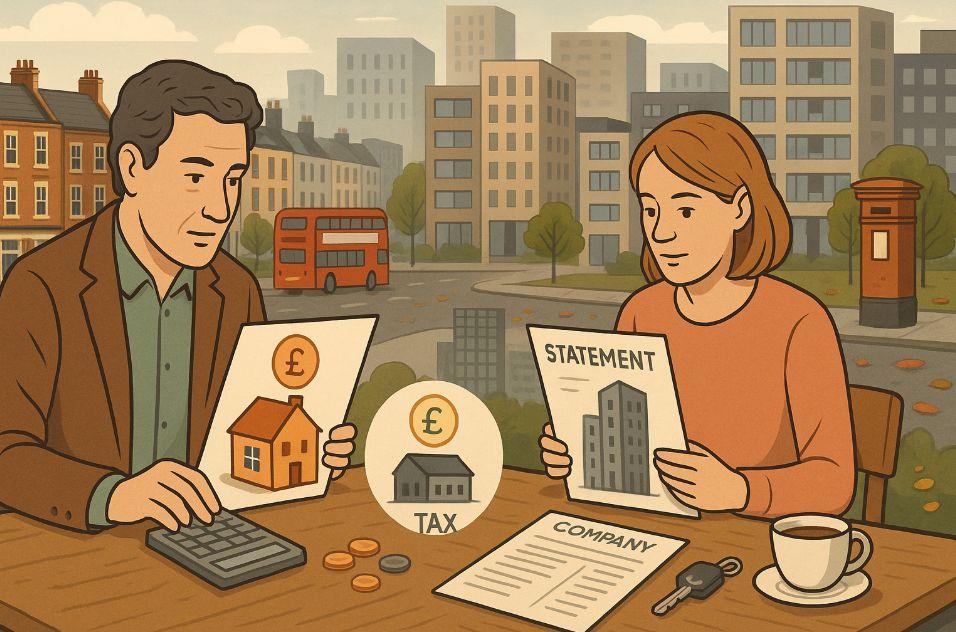In 2025, understanding mortgage interest tax relief in the UK remains a priority for homeowners, landlords, and property investors particularly those in high-value markets such as London.
With previous changes to property tax laws still impacting returns, the question “Is mortgage interest tax deductible in the UK in 2025?” continues to surface across financial discussions and tax planning conversations.
This article provides a comprehensive overview of current tax rules, the legacy of Section 24, and what property owners should know about mortgage interest in today’s regulatory landscape.
What Does Mortgage Interest Tax Deductibility Mean in the UK?

Mortgage interest tax deductibility refers to the process of reducing your taxable income by the amount of interest paid on a mortgage. In many countries, this has traditionally allowed property owners especially landlords to significantly reduce their annual tax bill. In the UK, however, the landscape has evolved considerably.
Historically, landlords were able to deduct the interest on their buy-to-let mortgages from rental income, effectively reducing their taxable profit. This made property investment a more attractive financial venture, particularly for higher-rate taxpayers.
However, homeowners living in their own properties have never benefited from such a tax break, as the interest on residential mortgages for personal use is categorised as a personal expense and not eligible for tax deductions.
How Did Mortgage Interest Tax Relief Change in Recent Years?
Significant changes began in 2017 with the implementation of Section 24 of the Finance (No. 2) Act 2015. This legislation gradually phased out the ability of individual landlords to deduct mortgage interest from their rental income. By April 2020, the process was complete, and landlords could no longer offset any mortgage interest directly against rental profits.
Instead, a new system was introduced offering a basic rate tax credit of 20% on the mortgage interest paid. This shift had a particularly sharp impact on landlords who were previously able to claim relief at the higher or additional tax rates. The result was a noticeable increase in tax bills for many, which has continued into 2025.
Is Mortgage Interest Tax-deductible for UK Homeowners in 2025?
Mortgage interest on a residential property used as a main home is not tax-deductible in the UK, and this remains unchanged in 2025. Homeowners cannot claim any tax relief on mortgage repayments, regardless of whether they are first-time buyers or long-time owners.
This policy differentiates the UK from other countries such as the United States, where mortgage interest relief for homeowners is a common feature of the tax system. In the UK, mortgage payments are considered a personal liability, not a business expense, and therefore not eligible for any kind of tax deduction under current legislation.
Can Landlords Deduct Mortgage Interest in the UK in 2025?

In 2025, individual landlords are no longer able to deduct mortgage interest directly from their rental income when calculating their income tax liability. Instead, they receive a 20% tax credit on the amount of interest paid. This credit is applied to the tax owed on rental income but does not reduce the rental income itself for taxation purposes.
This means that the full amount of rental income is still taxable, and the relief only comes into play at the end of the calculation, reducing the final tax bill. For higher-rate taxpayers, this change effectively increases the amount of tax paid, as they are no longer receiving relief at their marginal tax rate but at the basic rate only.
How Section 24 Affect Landlords in 2025?
Section 24, introduced through the Finance Act 2015, has reshaped how landlords manage their tax affairs. Prior to its implementation, landlords could fully deduct finance costs, including mortgage interest, from their rental income. With the full phase-out completed in 2020, individual landlords now receive a basic rate tax credit on their finance costs.
The impact of Section 24 in 2025 remains significant. Many landlords have seen their taxable profits increase, even though their actual profits after mortgage payments have not. This artificial inflation of taxable income has pushed some into higher tax brackets and reduced the viability of highly leveraged property investments, especially in expensive areas like London.
Are There Any Exceptions or Allowable Deductions Related to Mortgages?
While direct mortgage interest is no longer deductible for individual landlords, some finance costs still qualify for the 20% tax credit, including interest on loans taken to purchase or improve rental properties. Other expenses that can be deducted from rental income include letting agency fees, maintenance costs, insurance premiums, legal services, and utility bills paid on behalf of tenants.
However, it’s important to note that these deductions do not apply to homeowners and are strictly limited to rental business activities. Any attempts to claim mortgage interest relief outside the scope of rental income will not be accepted by HMRC.
How Do Limited Companies Benefit From Mortgage Interest Deductibility?

Unlike individual landlords, limited companies that operate rental businesses can still fully deduct mortgage interest from their rental income as a business expense. This makes incorporation an attractive option for many landlords seeking to retain greater tax efficiency, especially those with multiple properties or higher levels of borrowing.
In 2025, the ability to offset mortgage interest before corporation tax is calculated gives companies a significant advantage. While corporation tax rates vary, they are generally lower than higher personal income tax bands. However, company structures come with their own costs and complexities, including administrative duties, filing obligations, and potential tax on dividends when profits are withdrawn.
What Are the Implications for Buy-to-let Investors in London?
For landlords operating in London, where property prices and loan values are typically higher, the removal of mortgage interest relief has had a pronounced effect. The higher the mortgage, the greater the impact of losing interest deductions.
As a result, many London-based investors have explored alternative strategies to maintain profitability. These include moving investments to limited company structures, focusing on high-yield areas outside London, or switching to interest-only mortgage products. With rental demand in the capital remaining strong, investors are being forced to prioritise tax efficiency and long-term planning more than ever before.
How Can Landlords Legally Reduce Their Tax Burden in 2025?
Although the removal of mortgage interest deductibility has narrowed some tax-saving opportunities, landlords still have several legal avenues available. Many are choosing to incorporate their property portfolios, particularly when they plan to expand further. Others are restructuring ownership, for example by transferring part of the property to a spouse in a lower tax band.
Tax-deductible contributions to pensions, accurate expense tracking, and shifting to furnished holiday lets (which still qualify for more generous reliefs) are other options that can help reduce overall tax liability. In any case, engaging with a qualified accountant or tax advisor is strongly advised to ensure compliance and maximise efficiency.
What Might Change in Uk Mortgage Tax Rules After 2025?

While no specific reforms have been announced as of 2025, the property tax landscape remains subject to change. With upcoming general elections and ongoing discussions around housing affordability and taxation, future changes to mortgage interest tax policy cannot be ruled out.
Possible directions include adjustments to the tax credit rate, new incentives for energy-efficient properties, or differentiated treatment based on property size or value. Policy shifts will likely reflect broader political and economic priorities, and landlords should stay informed by following HMRC updates and budget announcements.
Mortgage Interest Tax Relief – Before vs. After Section 24
| Year | Deductible Mortgage Interest | Tax Credit Available | Who is Affected |
| Pre-2017 | 100% deductible | None | All landlords |
| 2020 onwards | 0% deductible | 20% of mortgage interest | Individual landlords |
| 2025 (Current) | 0% deductible | 20% of mortgage interest | Individual landlords only |
| Fully deductible (if Ltd. Co.) | Not applicable | Property companies / SPVs |
Conclusion
In summary, mortgage interest is not tax deductible for individual homeowners or landlords in the UK in 2025. While homeowners are not eligible for any relief, individual landlords can claim a 20% tax credit on interest payments. In contrast, limited companies continue to enjoy full deductibility, making this route increasingly popular for those with growing or highly-leveraged portfolios.
Understanding how these rules apply, especially in complex and high-stakes markets like London, is essential for anyone investing in property. Professional guidance and strategic tax planning are the best tools available to maximise returns and navigate the evolving tax environment.
FAQs
Can UK first-time buyers claim mortgage interest as a tax deduction?
No, the UK tax system does not provide mortgage interest relief for first-time buyers or any other homeowners in 2025.
Does mortgage interest count as a business expense in property rental?
For individual landlords, it does not. However, limited companies running rental businesses can deduct mortgage interest as a legitimate business expense.
Are there regional differences in mortgage tax rules across the UK?
No, the rules regarding mortgage interest tax apply uniformly across England, Wales, Scotland, and Northern Ireland.
How is mortgage interest treated in Scotland compared to England?
The treatment is identical. Tax regulations around mortgage interest relief are set at the UK level and enforced consistently across all nations.
Do high-rate taxpayers lose more from mortgage tax relief changes?
Yes. Since all landlords now receive only a 20% credit, high-rate taxpayers are no longer able to claim relief at their marginal tax rate, resulting in higher effective taxation.
Can I claim mortgage interest on a second home or holiday let?
You may be eligible if the property qualifies as a furnished holiday let, which follows a different set of tax rules and offers more generous reliefs.
Is mortgage interest ever tax-deductible for self-employed individuals?
Only if the mortgage is tied to a business property. Mortgage interest on a personal home is never tax-deductible, even for self-employed individuals.









Leave feedback about this